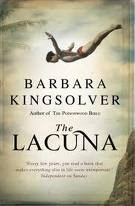
This book is 636 pages long. Now, bizarrely, by about the 300s I was already bored/irritated; but somehow I have managed to finish it. And it wasn’t so bad in the end.
The book is in the form of diary entries and letters. This is a really hard way to try and write a piece of fiction, and while it can succeed (fabulously, as Dodi Smith I CAPTURE THE CASTLE) it can also lack credibility and be so pretentious as to make you want to scream (THE LACUNA).
In this irritating format we follow the story of one Harrison Shepherd, born to a Mexican mother and an American father in Virginia. The book begins when Harrison is twelve and his mother takes him with her on a mad dash with a lover to Mexico.
There are some good bits, evocative and funny, early on, while it it still a young boy’s diary, such as:
Sunday is the worst day. Everyone else has family and a place to go. Even the bells from the churches have a conversation, all ringing at once. Our house is like an empty cigarette packet, lying around reminding you what’s not in it. The maid, gone to mass. Mr Produce the Cash, to the wife and children. Mother rinses her girdles and step-ins, flings them on the rails of the balcony to dry, and finds herself with nothing left to live for. Sometimes when there isn’t anything in the house to eat, she says, “Okay kiddo, it’s dincher dinner.” That means sharing her cigarettes so we won’t be hungry.
Harrison is not given much of an education and eventually ends up working as a cook and then a typist. Ridiculously, he finds this employement with Diego Rivera and Frida Kahlo at the time that Trotsky is staying with them. This must be among the least believable presentation of historically famous people it has ever been my misfortune to read. The author clearly went on a tour of the Rivera/Kahlo house in Mexico City, and thinks she is terribly clever to have noticed that the kitchen was small, and difficult for the cooks. Oh, what a sense of the reality of their lives! What a brilliant conjunction of art and the everyday! Why don’t I just puke right now.
He then moves to the US, where he becomes a famous author. Also pukily, he manges to be involved tangentially in the internment of Japanese Americans and the Communist witchhunts. He also manages to have incredibly stilted dialogue with this secretary. Fix your eyes in your sockets for this sample:
“Well, people think that. And taking the Fifth means you’re guilty.”
“Whatever they may think, it does not. A blank space on a form, the missing page, a void, a hole in your knowledge of someone – it’s still some real thing. It exists. You don’t get to fill it in with whatever you want, Mrs Brown.”
Do you see what she’s doing there, title wise? It’s truly incredible how often the author manages to introduce the title of her book in different ways. Was it some kind of weird literary bet?
Overall, I feel mean saying it, but it’s a sweet relief with Mr Shepherd dies.
